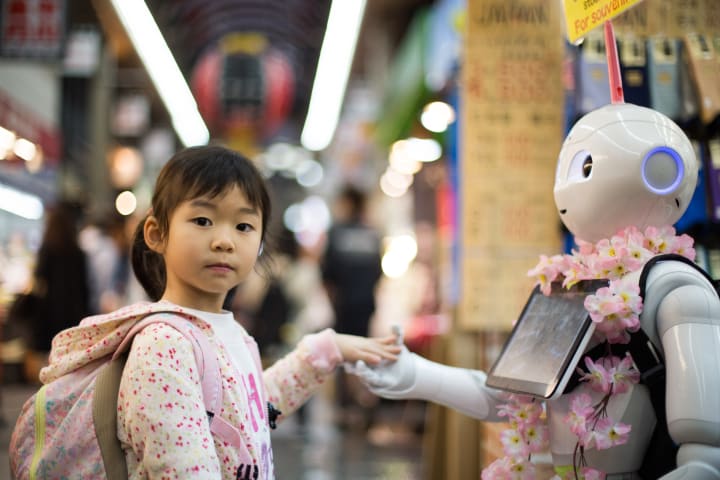Technology vs Humanity
Will new technologies change human values?

Ever since the period of the first Industrial Revolution in the nineteenth century, writers, philosophers, politicians and religious leaders have expressed concern about the impact of new technologies on human behavior and values. We are currently living through an era in which information and communication technologies are developing more rapidly than ever before. But how will this new technological revolution affect future generations’ ideas about what it means to be human?
To make projections about how human values might be changed as a result of new technologies, we need to consider what the term, “human values” actually means to the majority of people. Throughout history, humans have tended to think of values as universal guiding principles for the individual; principles which are essential for positive interaction in our daily lives, whatever our religion, nationality, culture or personal background.
Every day, we encounter testing situations and find ourselves having to make difficult decisions. Our values guide us through these and constantly help us to decide how to respond. When our behavior is aligned with our values, life feels good and we feel content and fulfilled. But when our behaviors do not correspond with our values, we tend to feel uncomfortable and uneasy, and these feelings can lead to anxiety and unhappiness.
So, what are the behaviors and attitudes that we most value in human beings, and what do we tend to think is at the core of what it means to be “a good human”? I think most people would agree that some of these traits might include: patience; tolerance; kindness; generosity; trust, selflessness; honesty; loyalty; empathy; compassion; and respect.

These concepts have traditionally been passed down through religious instruction, parental example, storytelling, peer influence, and laws. As religious affiliation has declined and secularism has risen across the western world, media channels have increasingly taken on the responsibility of reinforcing ideas about how we ought to behave, through more sophisticated methods of storytelling: films, TV, theater, radio, newspapers, magazines, and the internet.
Although these media channels continue to permeate western culture with their influential messages, they are still essentially driven mostly by physical human labor and creativity. However, the next phase of technological development will bring a seismic shift towards artificial intelligence, whereby many aspects of our lives will be anticipated and carried out by machines. Humans will increasingly interact with robots and other electronic devices, in a world where machines will have the ability to make decisions on our behalf.
When artificial intelligence becomes the driving force behind the majority of new technologies, human behaviors will inevitably be affected.

Already, new voice technologies enable us to ask our devices questions, to which we receive immediate answers; drones are able to capture moving images from the air; the use of AI in robotics is revolutionising the manufacturing industry, cars are able to drive themselves; social media channels and search engine bots are busily learning everything about us, so that they can tailor content and ads with precision; and bio-engineering technologies are able to genetically modify species and implant bio-electric devices inside our bodies. However, these examples are just the tip of an enormous iceberg.
Artificial intelligence technology promises to revolutionize human life as we know it. But just how intelligent can machines become? Intelligence is the driving force that distinguishes humans from other animal groups, and has enabled us to become the dominant species. Surely, any attempt to replicate and embody this powerful force inside increasingly complex machines is destined to become an attempt to recreate humanity itself?
If we are going to continue to allow machines and robots to control so many aspects of our lives, how can we ensure that they adopt the human values most of us would agree are essential to the preservation of human life? Values that give our lives meaning. Just how do we teach machines values and traits such as forgiveness and resilience, compassion and empathy, trust and respect? And what will become of autonomy and free will, if and when we get to the stage where machines essentially become extensions of our human selves?
These are the questions we must ask ourselves before we begin to develop future AI technologies, if we want to avoid a similar fate to Frankenstein.
However, humans are very complicated creatures — unpredictable and often unfathomable. We experience a huge range of emotions, all of which are inextricably intertwined with those core human values we started with. To fully replicate the human state, machines would need to master emotional intelligence, as well as artificial intelligence.

Emotional experience arises from judgements we make about the world around us, ourselves and others. But, despite developing technologies such as automated reasoning, machine learning still has a long way to go before it can actually create convincing artificial humans, meaning there is no danger we will become a redundant species anytime soon.
Nonetheless, our behaviors have been changing dramatically in recent years, due to rapid technological change and development. So, is it inevitable that behavioral change will have some kind of impact on our values?
Our 24/7 reliance on digital technologies has already transformed how we communicate and interact. We have come to expect instant responses to our messages and we crave constant updates about everything. People increasingly live their lives with a sense of urgency, and privacy is often no longer respected. Could it be that these “machine values” — instant gratification; self-obsession; voyeurism; exhibitionism — are replacing the human values we have held dear for millennia?
We increasingly expect everything to be available to us in an instant, in one click, at lightning speed — whether it’s information, conversation, things we want to consume, or things we want to do. People are no longer willing to hang around for long enough to learn that “Patience is a virtue”.
We live our lives through screens, where we encounter an abstract world that is becoming increasingly artificial. Our connection to physical reality is being replaced by our immersion in a virtual reality which encourages us to live out our existence in the public arena, documenting every aspect of our lives, every hour of every day.

We live in the Age of the Self. Modern storytelling doesn’t concern itself with a third person narrative — first person accounts are all that matters. Selflessness becomes meaningless as a human value, when it is “the self” that is valued above all else.
In a world where all of our lives are readily available for public consumption, we all become vulnerable. Our virtual selves are prone to attack from anonymous keyboard warriors, stalkers, thieves, bullies, spammers, scammers and hackers; exploitation by global corporations and employers; and radicalization by political and religious extremists. No room here for Honesty, Compassion, Tolerance, Kindness and Respect.
Even close familial and intimate relationships can suffer, as everyone is now able to assume the role of a private detective. After all, when it is so easy to snoop or spy on somebody, why wouldn’t you? And so we wave goodbye to Trust.
If we are to survive and flourish in the virtual digital world, we need to accept individual responsibility for our interactions. In an environment where it is possible to be attacked, exploited, groomed or bullied by anyone, anytime, anywhere in the world, it becomes more vital than ever to hold on to and protect those core human values.
Before all this becomes too depressing, it is worth pointing out that there are also many, many amazing benefits to be gained from these new technologies. Life-saving medical devices, improved efficiency for businesses, the potential to solve complex social problems and reduce suffering – these are all very good reasons to pursue technological advancement.

It has always been the case that technology can either be used for admirable purposes such as these, or for abusive ends, to the detriment of human life, other species, and, ultimately, the planet itself. It can be designed and used to add to the human experience, or to diminish and detract from it. To prevent the latter, we just have to ensure that technology doesn’t run away with us, or become us along the way.
As long as technological development is placed in the hands of those who cherish human values in the first place, we should be OK. Designers, developers and inventors should start from a place of considering whether what they are trying to achieve will serve to reinforce our human values, rather than being driven by egotistical attempts to gain personal glory, profit or power. Intellectual inquiry needs to be motivated by a desire to improve the human condition, to make humans more compassionate, more kind, more honest, more tolerant.
We should be constantly risk-assessing the development of new technologies to ensure that the positives always outweigh the potential negatives. Surely, it would be a mistake to forego those human values that have sustained us since the beginning of time? We need to choose our future path wisely, or we risk severing the bonds that hold our communities together. Just because we can, doesn’t always mean we should.
About the Creator
Marie Bootcamp Media
Copywriter at Bootcamp Media, a cool digital marketing agency based in Birmingham, UK. I also blog for pleasure, and my special interests are music, screenwriting, business and interior design.







Comments
There are no comments for this story
Be the first to respond and start the conversation.